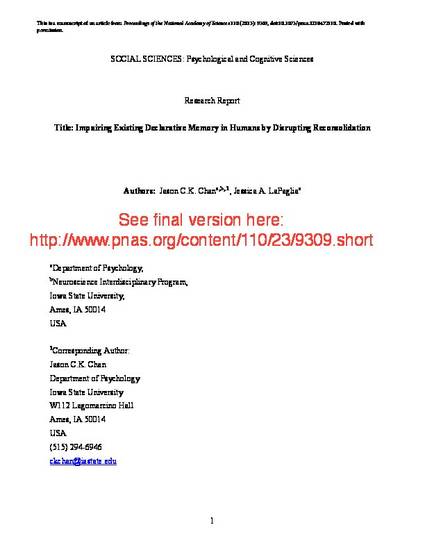
Article
Impairing Existing Declarative Memory in Humans by Disrupting Reconsolidation
Proceedings of the National Academy of Sciences of the United States of America
Document Type
Article
Disciplines
Publication Date
4-1-2013
DOI
10.1073/pnas.1218472110
Abstract
During the past decade, a large body of research has shown that memory traces can become labile upon retrieval and must be restabilized. Critically, interrupting this reconsolidation process can abolish a previously stable memory. Although a large number of studies have demonstrated this reconsolidation associated amnesia in nonhuman animals, the evidence for its occurrence in humans is far less compelling, especially with regard to declarative memory. In fact, reactivating a declarative memory often makes it more robust and less susceptible to subsequent disruptions. Here we show that existing declarative memories can be selectively impaired by using a noninvasive retrieval–relearning technique. In six experiments, we show that this reconsolidation-associated amnesia can be achieved 48 h after formation of the original memory, but only if relearning occurred soon after retrieval. Furthermore, the amnesic effect persists for at least 24 h, cannot be attributed solely to source confusion and is attainable only when relearning targets specific existing memories for impairment. These results demonstrate that human declarative memory can be selectively rewritten during reconsolidation.
Copyright Owner
Chan, et al.
Copyright Date
2013
Language
en
File Format
application/pdf
Citation Information
Jason C.K. Chan and Jessica A. LaPaglia. "Impairing Existing Declarative Memory in Humans by Disrupting Reconsolidation" Proceedings of the National Academy of Sciences of the United States of America Vol. 110 Iss. 23 (2013) p. 9309 - 9313 Available at: http://works.bepress.com/jason_chan/19/

This is a manuscript of an article from Proceedings of the National Academy of Sciences 110 (2013): 9309, doi:10.1073/pnas.1218472110. Posted with permission.